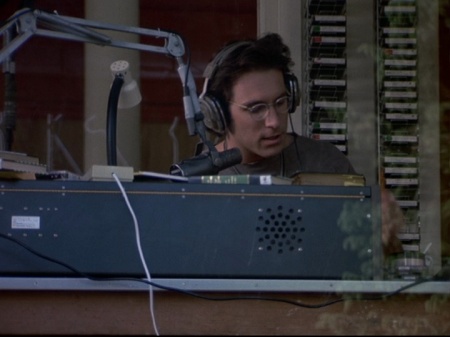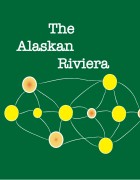Episode: 1.2
Title: “Brains, Know-How and Native Intelligence”
Written by: Stuart Stevens
Directed by: Peter O’Fallon
Date Aired: July 19, 1990
Plot Summary: Ed asks Joel to help his ailing uncle, while Chris is fired from his radio show because of an American poet. Meanwhile, Joel has plumbing trouble and has to ask for Maggie’s help.
Listen to the podcast of the episode here.
Becoming a Cecilian
After quite a dense pilot episode that introduces us to the show’s premise, to the town and its characters, the second episode is nearly perfect. In terms of quality and depth, 1.2 is head and shoulders above the preceding episode, as if the creators suddenly realized they had forgot to finish training the staff before the grand opening. Everyone is impeccably prepared for the second outing. In today’s era of amazing television where so much happens (see Breaking Bad, The Wire, Mad Men), the beauty of Northern Exposure is nothing much happens, but the show is still endlessly entertaining.
Take, for example, “Brains, Know-How, and Native Intelligence.” Maurice fires Chris (who is hired back again at the end of the show), Joel makes a house call while having plumbing problems and Maggie argues with Joel (yet again). On the surface, not much occurs – certainly not enough to have a one-hour episode. But what makes Northern Exposure unique is not the plot development, but the depth of everyday interactions between characters. More than most other shows, the series’ characters seem particularly well-rounded. Why is this? While the acting is great, it’s not the only factor. It’s not exactly the ‘quirks’ of the character either. The characters seem to have inner lives and outer interests. Many times we watch TV characters react to situations, but when we look more closely, we realize that we don’t really know much about them – what they’re interested in, what they like to do in their spare time, how they would feel about certain things. This is the opposite of Northern Exposure; we get to know the characters as we get to know people in real life, just by being with them, and spending time with them. There are a few longer story lines that weave through each season but you can drop into nearly any episode in any season and just enjoy the interactions between characters because, for the most part, Northern Exposure is the character study of a community. With time, we begin to feel like we are a part of that community, which is an incredible feat for a television show. (To quote the theme to another TV series that aired during the early ‘90s, “And they’re always glad you came. You want to be where you can see our troubles are all the same. You want to be where everybody knows your name.” To pick up on an idea we introduced when discussing the pilot, Cheers is another “hangout show” like Northern Exposure, though it’s one with far fewer ideas and less nuanced characters.)

In the opening scene of 1.2, we are introduced to Chris Stevens, the local radio DJ, for the first time. Instead of playing music, he reads Walt Whitman’s poem “When Lilacs Last In the Dooryard Bloom’d.” This is the moment when the show announces its originality. Who ever heard of a TV show mentioning a 19th century American poet, let alone reading aloud the entire first stanza of one of his poems? We learn how Whitman was the catalyst through which Chris began his transformation from a juvenile delinquent to who he is today. Of course poetry has changed many people’s lives, but rarely do we ever see this experience discussed on television. We claimed earlier that the show’s characters resemble real people but they may more accurately be characterized as hyper-real because we often glimpse their true nature quickly, whereas people are often opaque initially and reveal themselves to us slowly. The characters in Northern Exposure are themselves. They are unapologetically who they are, which is something many people in the real world aspire to be, if you think about it.
Walt Whitman, John Keats, and “Native Intelligence”
As we mentioned in the podcast, one of the major themes in this episode is right in the title itself. 1.2 explores types of intelligence: brains, know-how, and “Native intelligence.” The first two are relatively straightforward, with brains referring to academic intelligence, as represented by Joel. Know-how is practical knowledge held by the likes of Maggie and Holling; it includes hands-on skills such as plumbing and the frontier expertise that most Cicelians seem to have. The third kind of intelligence, the so-called “Native intelligence” is a little more difficult to define. It is represented by Uncle Anku in this episode, and is exemplified in his advice to Joel, “If you want to catch a fish, think like a fish.” This is the kind of knowledge that can’t necessarily be pinned down with logic (or else your brain might hurt), and is something that you can’t comprehend with the rational mind. This kind of knowledge seems instinctive – arising from the body, as in the case of dancing, or acknowledging the role of the spirit in healing the body.
But what does “If you want to catch a fish, think like a fish” actually mean? It might have to do with outlook – not seeing yourself as a separate being, but actually lowering the boundaries between yourself and others, letting notions of the self go, and allowing other beings (both inanimate and animate) pass through you. While this seems relegated to the Native characters on the show (primarily Anku and Ed in this episode), on closer look it is a kind of philosophical outlook that’s beyond boundaries. (This is supported by a deleted scene in which Chris asks Joel, “Have you tried thinking like a shower?” Joel has heard this before, so he asks Chris, “You know Anku?” Chris simply says, “No.”)
This idea is underscored by this episode’s focus on Walt Whitman. He is a capacious poet who writes in the first person, but his subject is truly beyond the “I.” In “Song of Myself,” he writes, “For every atom belonging to me as good belongs to you.” In the poem that Chris reads on the radio, “When Lilacs Last in the Dooryard Bloom’d,” the speaker contemplates a star, then finds himself occupying the consciousness of a bird hidden in a thrush, then on passing through a pastoral scene, then following the passage of the coffin as it travels from Washington, D.C., to Springfield, Illinois, to the battlefield of war, and beyond. There is no stable sense of self, but more a searching, permeable self that can inhabit others and, and, in turn, be inhabited by them.
This idea of transcending the boundaries of self is connected to the Romantic poet John Keat’s idea of ‘negative capability,’ which he mentions and defines in a letter:
I mean Negative Capability, that is, when a man is capable of being in uncertainties, mysteries, doubts, without any irritable reaching after fact and reason – Coleridge, for instance, would let go by a fine isolated verisimilitude caught from the Penetralium of mystery, from being incapable of remaining content with half-knowledge. This pursued through volumes would perhaps take us no further than this, that with a great poet the sense of Beauty overcomes every other consideration, or rather obliterates all consideration.
Keats stresses the experience of dwelling in not knowing, and resists the notion of pinning things down with reason or academic thought. There is a kind of joy in being undefined, to leaving the self open to be overtaken, overwhelmed by the external world. The self here is like a vessel with different selves continually flowing through like wisps of smoke. As Whitman wrote in “Song of Myself,” “Do I contradict myself? / Very well then I contradict myself / (I am large, I contain multitudes.)”
But where does this leave us with the episode? Clearly the connections between “Native intelligence,” Walt Whitman, and John Keats reveal a thoughtfulness in writing and characterisation that is remarkable for a television show. But within the series it serves as a challenge to our main protagonist as well. Joel is the character most bound up in his own sense of self, that of the ‘Jewish New York doctor’; his identity is defined by his New York experiences, and as we saw in the pilot, anything that threatens the fortress of his identity results in a tantrum. In this episode, however, Joel seems to be growing as a person, and is willing to open himself up to this new kind of thinking. In the end we see a depth to him that we haven’t thus far seen; while he may not ever master ‘know-how,’ he is surprisingly open to ‘Native intelligence’. For a doctor who declares that he doesn’t do house calls, he ends up doing quite a few and even seems to be “thinking like a fish” to some degree. Perhaps there is hope for him indeed.
Themes / Echoes: Different kinds of intelligence; the idea of the hero; pride; dancing.
The Good – Ed (Darren E. Burrows) is amazing in this episode. His puppy dog pleading to Joel in the street scene is heart-melting and sad. Frank Sotonoma Salsedo’s performance of Uncle Anku is also wonderful – filled with wisdom, humour, and a slight slyness.
The Bad – It’s difficult to pinpoint much badness in this episode. If we had to find fault, we might mention a few tiny hiccups where characters seem overly broad, such as when Joel shouts, “I CANNOT LIVE WITHOUT A TOILET!”
The Notable – Armenia Miles, the actress who plays Mrs. Anku, is the real-life mother of Elaine Miles, who plays Marilyn. (She will later appear in the series as Mrs. Whirlwind, Marilyn’s mother.)
On’s rating: 9 out of 10
Shane’s rating: 9 out of 10





What a brilliant episode so early into a series, and re-capped brilliantly by you guys, as well. I originally found your podcast when I was re-watching the series and was towards the end of season 4, I think, so it’s great to start over and have you guys in the saddle the whole way.